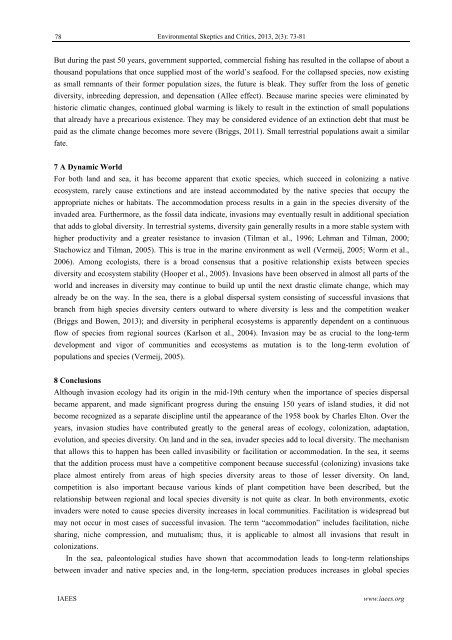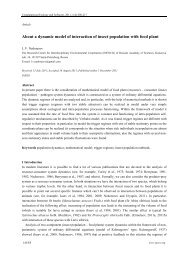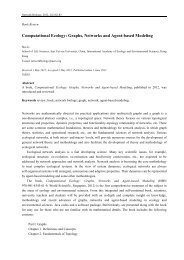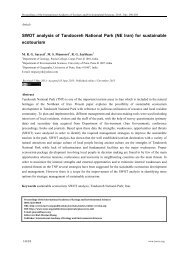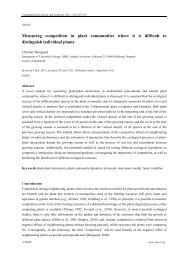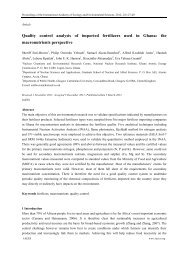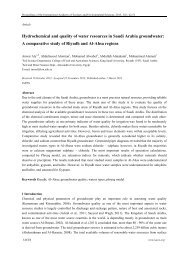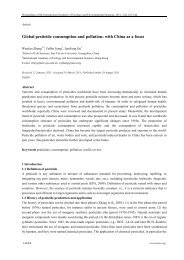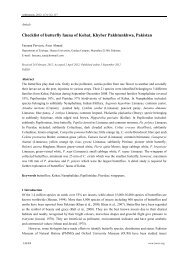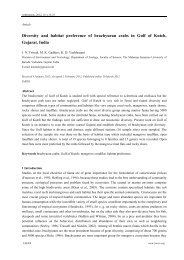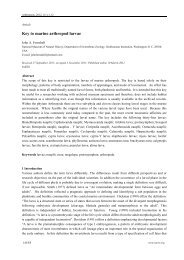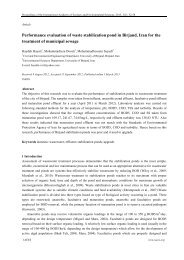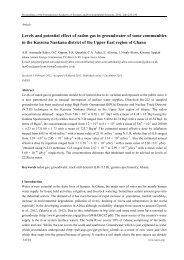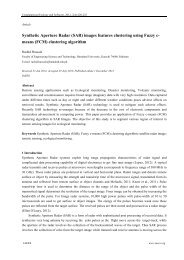Invasion ecology: Origin and biodiversity effects - JournalTOCs
Invasion ecology: Origin and biodiversity effects - JournalTOCs
Invasion ecology: Origin and biodiversity effects - JournalTOCs
You also want an ePaper? Increase the reach of your titles
YUMPU automatically turns print PDFs into web optimized ePapers that Google loves.
78<br />
Environmental Skeptics <strong>and</strong> Critics, 2013, 2(3): 73-81<br />
But during the past 50 years, government supported, commercial fishing has resulted in the collapse of about a<br />
thous<strong>and</strong> populations that once supplied most of the world’s seafood. For the collapsed species, now existing<br />
as small remnants of their former population sizes, the future is bleak. They suffer from the loss of genetic<br />
diversity, inbreeding depression, <strong>and</strong> depensation (Allee effect). Because marine species were eliminated by<br />
historic climatic changes, continued global warming is likely to result in the extinction of small populations<br />
that already have a precarious existence. They may be considered evidence of an extinction debt that must be<br />
paid as the climate change becomes more severe (Briggs, 2011). Small terrestrial populations await a similar<br />
fate.<br />
7 A Dynamic World<br />
For both l<strong>and</strong> <strong>and</strong> sea, it has become apparent that exotic species, which succeed in colonizing a native<br />
ecosystem, rarely cause extinctions <strong>and</strong> are instead accommodated by the native species that occupy the<br />
appropriate niches or habitats. The accommodation process results in a gain in the species diversity of the<br />
invaded area. Furthermore, as the fossil data indicate, invasions may eventually result in additional speciation<br />
that adds to global diversity. In terrestrial systems, diversity gain generally results in a more stable system with<br />
higher productivity <strong>and</strong> a greater resistance to invasion (Tilman et al., 1996; Lehman <strong>and</strong> Tilman, 2000;<br />
Stachowicz <strong>and</strong> Tilman, 2005). This is true in the marine environment as well (Vermeij, 2005; Worm et al.,<br />
2006). Among ecologists, there is a broad consensus that a positive relationship exists between species<br />
diversity <strong>and</strong> ecosystem stability (Hooper et al., 2005). <strong>Invasion</strong>s have been observed in almost all parts of the<br />
world <strong>and</strong> increases in diversity may continue to build up until the next drastic climate change, which may<br />
already be on the way. In the sea, there is a global dispersal system consisting of successful invasions that<br />
branch from high species diversity centers outward to where diversity is less <strong>and</strong> the competition weaker<br />
(Briggs <strong>and</strong> Bowen, 2013); <strong>and</strong> diversity in peripheral ecosystems is apparently dependent on a continuous<br />
flow of species from regional sources (Karlson et al., 2004). <strong>Invasion</strong> may be as crucial to the long-term<br />
development <strong>and</strong> vigor of communities <strong>and</strong> ecosystems as mutation is to the long-term evolution of<br />
populations <strong>and</strong> species (Vermeij, 2005).<br />
8 Conclusions<br />
Although invasion <strong>ecology</strong> had its origin in the mid-19th century when the importance of species dispersal<br />
became apparent, <strong>and</strong> made significant progress during the ensuing 150 years of isl<strong>and</strong> studies, it did not<br />
become recognized as a separate discipline until the appearance of the 1958 book by Charles Elton. Over the<br />
years, invasion studies have contributed greatly to the general areas of <strong>ecology</strong>, colonization, adaptation,<br />
evolution, <strong>and</strong> species diversity. On l<strong>and</strong> <strong>and</strong> in the sea, invader species add to local diversity. The mechanism<br />
that allows this to happen has been called invasibility or facilitation or accommodation. In the sea, it seems<br />
that the addition process must have a competitive component because successful (colonizing) invasions take<br />
place almost entirely from areas of high species diversity areas to those of lesser diversity. On l<strong>and</strong>,<br />
competition is also important because various kinds of plant competition have been described, but the<br />
relationship between regional <strong>and</strong> local species diversity is not quite as clear. In both environments, exotic<br />
invaders were noted to cause species diversity increases in local communities. Facilitation is widespread but<br />
may not occur in most cases of successful invasion. The term “accommodation” includes facilitation, niche<br />
sharing, niche compression, <strong>and</strong> mutualism; thus, it is applicable to almost all invasions that result in<br />
colonizations.<br />
In the sea, paleontological studies have shown that accommodation leads to long-term relationships<br />
between invader <strong>and</strong> native species <strong>and</strong>, in the long-term, speciation produces increases in global species<br />
IAEES<br />
www.iaees.org


